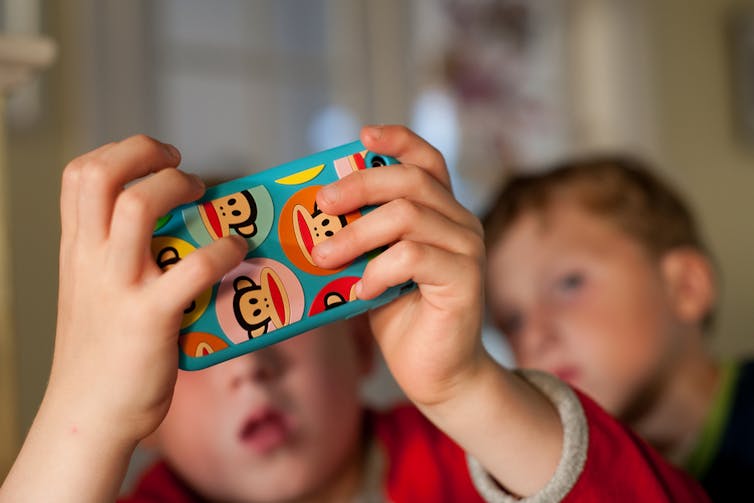| MercatorNet |October 30, 2017| MercatorNet |


3 reasons why we are addicted to smartphones
They fulfill some basic needs, but not the need to show up in person and make a difference

Apple recently announced the launch of its iPhone 8 and iPhone X, which come with sleek, new features. Apple also hopes to start a new community around the iPhones. Ahead of the launch, Angela Ahrendts, head of retail at Apple, said their stores will be called “Town Squares,” and would double as public spaces, complete with outdoor plazas, indoor forums and boardrooms.
The much-anticipated product launch was followed by millions who watched the event via livestream and on internet forums, blogs and in the news media.
I, too, was among them.
So, what draws people to these phones? Surely, it is not just the groundbreaking design or the connection with a community. As a minister, psychotherapist and scholar studying our relationship with hand-held devices, I believe there is much more going on.
In fact, I’d argue, as I do in my book “Growing Down: Theology and Human Nature in the Virtual Age,” the phones tap into our basic yearnings as humans.
Here are my three reasons why we love our phones.
1. Part of an extended self
Our sense of self is shaped while we are still in the womb. The development of the self, however, accelerates after birth. A newborn, first and foremost, attaches herself to the primary caregiver and later to things – acquiring what has been called an “extended self.”
The leading 20th-century American psychologist William James was among the first to argue for an extended self. In his “Principles of Psychology,” James defined the self as “the sum total of all that a man can call his, not only his body and his psychic powers, but his clothes and his house, his wife and children.” Losing any of this extended self, which could include money or another prized object, as he explained, could lead to a sense of great loss. In early childhood, for example, babies and toddlers cry if they suddenly lose their pacifier or favorite soft toy, objects that become part of their extended selves.

Phones, I argue, play a similar role. It is not uncommon for me to feel a sudden onset of anxiety should I drop my phone or am unable to find it. In my experience, many individuals feel the same way. It is also reflected in how often many of us check our devices.
Psychologist Larry Rosen and his colleagues at California State University found that 51 percent of individuals born in the 1980s and 1990s experienced moderate to high levels of anxiety when they were kept from checking in with their devices for more than 15 minutes. Interestingly, the percentage drops slightly – to 42 percent – for those born between 1965 and 1979.
This is primarily because they came into being during a time where hand-held technologies were only beginning to make their entry. For this group, phones became part of their extended self only as late teens or as young adults.
2. Recalling caring relationships
Not just extended selves, smartphones in particular, with their games, apps and notifications, have become an essential aspect of our sense of self.
And here’s how:
Drawing on psychodynamic theory, which holds that childhood experiences shape personality, I argue that our relationship with technology mirrors the environment our parents created in caring for us. This environment, as British psychiatrist Donald W. Winnicott writes, functions around touch, a keen awareness of what the infant needs, and establishing and maintaining eye contact.
In the same way, we, as adults, reexperience touching and belonging through our phones. Technology affords a space where the self can be satisfied, play and feel alive – a space previously provided by caregivers.
When we hold our phones, it reminds us of moments of intimacy – whether from our childhood or from our adult life. The brain chemical dopamine and love hormone oxytocin, which play a role in the addiction “high,” kick in. These chemicals also create a sense of belonging and attachment.

Holding our phone has the same effect as when a parent looks lovingly at her child or when two lovers gaze into each other’s eyes. In the words of Apple executive Philip Schiller: The iPhone X “learns who you are.”
Theological reflection also supports what we have learned about dopamine and oxytocin. The Judeo-Christian tradition, for example, identifies God as an intimate God who seeks face time and creates caring environments. In Bible, Numbers 6:24-26, we read:
“The Lord bless you and protect you. The Lord make his face shine on you and be gracious to you. The Lord lift up his face to you and grant you peace.”
3. Fulfills need to produce and reproduce
Anthropologist Michael Taussig reminds us that it is in our “second nature to copy, imitate, make models, [and] explore difference” as we try to become a better or different self.
Phones help us do that. We take pictures, manipulate images, join discussions, curate a selfie and reach out to others. By texting back and forth, we weave together a conversation. Through searching, we become knowledgeable (even if we lack wisdom). Thus, we join ancestors who painted on cave walls and told stories around fires.
It should not come as a surprise then that smartphones currently account for 46 percent of all internet use. This is expected to grow to 75 percent by 2021. We are destined, it seems, to live with our phones in hand.
Living with technology
Having said this, sometimes, however, I would argue, we need to show up in person and make a difference.
We can be disappointed if we limit our spaces and relationships to small screens or to “town squares.” We need intimate relationships where we give and receive touch, where we gaze into someone’s eyes. We also need spaces – some will be online – where deep connections can be made, where we can rest, play and discover.
So, as some of us head over to the Town Square to purchase the latest iPhone or venture online, it would be best to remember the dictum of historian of technology Melvin Kranzberg:
“Technology is neither good nor bad; nor is it neutral.”
Jaco J. Hamman, Associate Professor of Religion, Psychology, and Culture, Vanderbilt University
This article was originally published on The Conversation. Read the original article.

Tomorrow brings that ubiquitous American festival, Halloween, which increasingly makes itself Down Under. Zac Alstin laments this development and has posted his theses against it. “Halloween in Australia is profoundly meaningless, deeply inauthentic,” he writes. “On the other hand, an increasing number of Australians feel like doing it… And what could be more authentically Australian than people doing what they want, because they enjoy it?” What indeed.
Today, however, is National Cat Day in the United States and that is an observance I could live with if it reached this part of the world. The US Poetry Foundation alerted me to it via today’s poem (they send one every day) by Christopher Smart, an 18th century gentleman who was better at experimenting with poetry than providing for his wife and children, sad to say.
Amongst a number of pieces in a collection called Jubilato Agno is a delightful poem about his cat, somewhat Biblical in style and explicitly Christian in its worldview (he had been intended originally for the Church). Here are the opening lines:
For I will consider my Cat Jeoffry.
For he is the servant of the Living God duly and daily serving him.
For at the first glance of the glory of God in the East he worships in his way.
For this is done by wreathing his body seven times round with elegant quickness.
For then he leaps up to catch the musk, which is the blessing of God upon his prayer.
For he rolls upon prank to work it in.
For having done duty and received blessing he begins to consider himself…
The rest is here, for the enjoyment of all cat lovers.
We are getting in early with our Scrooge-like take on Halloween because we are ahead in time and also because there will not a newsletter tomorrow. For the time being we are cutting back to three newsletters a week: Monday, Wednesday and Friday.
Happy Halloween, if it’s your thing!
Today, however, is National Cat Day in the United States and that is an observance I could live with if it reached this part of the world. The US Poetry Foundation alerted me to it via today’s poem (they send one every day) by Christopher Smart, an 18th century gentleman who was better at experimenting with poetry than providing for his wife and children, sad to say.
Amongst a number of pieces in a collection called Jubilato Agno is a delightful poem about his cat, somewhat Biblical in style and explicitly Christian in its worldview (he had been intended originally for the Church). Here are the opening lines:
For I will consider my Cat Jeoffry.
For he is the servant of the Living God duly and daily serving him.
For at the first glance of the glory of God in the East he worships in his way.
For this is done by wreathing his body seven times round with elegant quickness.
For then he leaps up to catch the musk, which is the blessing of God upon his prayer.
For he rolls upon prank to work it in.
For having done duty and received blessing he begins to consider himself…
The rest is here, for the enjoyment of all cat lovers.
We are getting in early with our Scrooge-like take on Halloween because we are ahead in time and also because there will not a newsletter tomorrow. For the time being we are cutting back to three newsletters a week: Monday, Wednesday and Friday.
Happy Halloween, if it’s your thing!
 Carolyn Moynihan
Carolyn MoynihanDeputy Editor,
MERCATORNET
Halloween and other nightmares
By Zac Alstin
What could be more authentically Australian?
Read the full article
Read the full article
Do women get a raw deal in assisted dying?
By Rachael Wong
There are many 'gendered risks' in assisted dying
Read the full article
Read the full article
Nothing to celebrate: 50 years of abortion in Britain
By Philippa Taylor
An incredible 9 million lives have been lost.
Read the full article
Read the full article
3 reasons why we are addicted to smartphones
By Jaco J. Hamman
They fulfill some basic needs, but not the need to show up in person and make a difference
Read the full article
Read the full article
Was Emily Brontё‘s Heathcliff black?
By Corinne Fowler
It makes sense. The Brontё family had black slaves in their neighbourhood.
Read the full article
Read the full article
More than Harvey’s secret is out
By Andrea Mrozek
Everything from relationships to shopping malls is corrupted.
Read the full article
Read the full article
Martin Luther’s post-modern legacy: reason refuting reason
By John Robson
The 16th Century theologian foreshadowed some contemporary pathologies
Read the full article
Read the full article
I was an eight-year-old drag queen
By Chad Felix Greene
Sexualising children has dangerous consequences.
Read the full article
Read the full article
Balancing patients’ liberty and public safety in mental health care
By Niall McCraeand Kathy Gyngell
It’s in everybody’s interests to provide a dignified mental health service.
Read the full article
Read the full article
Are the kids really OK?
By Michael Cook
Australia's best-known medical journal presents a comforting picture of gay parenting.
Read the full article
Read the full article
MERCATORNET | New Media Foundation
Suite 12A, Level 2, 5 George Street | North Strathfield NSW 2137 | AU | +61 2 8005 8605
















































No hay comentarios:
Publicar un comentario